Nonflowering - Study guides, Class notes & Summaries
Looking for the best study guides, study notes and summaries about Nonflowering? On this page you'll find 28 study documents about Nonflowering.
All 28 results
Sort by

-
ABEKA Biology Chapter 5 Chapter Review GCA Latest Update Graded A
- Exam (elaborations) • 6 pages • 2024
-
- $7.99
- + learn more
taxonomy process of arranging organisms into groups based on similarities kind group of similar organisms that are all descended from a single group of originally created organisms vascular plant any of the plants that have vascular tissue; also called tracheophyte nonvascular plant any nonseed plant that does not have vascular tissue gymnosperm plant that does not produce flowers but does produce seeds conifer cone-bearing gymnosperm fern nonflowering vascular plant with spore-bearing le...

-
ABEKA Biology Chapter 5 Chapter Review GCA Latest Update Graded A
- Exam (elaborations) • 6 pages • 2024
-
- $7.99
- + learn more
taxonomy process of arranging organisms into groups based on similarities kind group of similar organisms that are all descended from a single group of originally created organisms vascular plant any of the plants that have vascular tissue; also called tracheophyte nonvascular plant any nonseed plant that does not have vascular tissue gymnosperm plant that does not produce flowers but does produce seeds conifer cone-bearing gymnosperm fern nonflowering vascular plant with spore-bearing le...
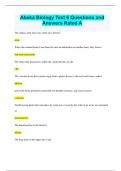
-
Abeka Biology Test 6 Questions and Answers Rated A
- Exam (elaborations) • 9 pages • 2024
- Available in package deal
-
- $9.99
- + learn more
Abeka Biology Test 6 Questions and Answers Rated A The stigma, style and ovary make up a flower's pistil When the rounded head of one bone fits into an indentation on another bone, they form a ball-and-socket joint The finger-like projections within the small intestine are the villi The vascular tissue that carriers sugar from a plant's leaves to the roots and stem is called phloem part of the brain primarily responsible for thought, memory, and consciousness cerebrum Nonflowering ...

-
Abeka Biology: Semester Exam Latest Update Graded A+
- Exam (elaborations) • 10 pages • 2024
- Available in package deal
-
- $9.99
- + learn more
Abeka Biology: Semester Exam Latest Update Graded A+ Long bone of the upper arm Humerus Process in which bacteria reproduce by dividing Binary fission Carries sugar from a plant's leaves to the roots and stem Phloem Tumor that shows no tendency to spread through the body Benign Body system consisting of various glands that produce hormones Endocrine Body system that transports oxygen and nutrients to cells and carries away waste products Circulatory Membrane that preven...
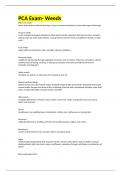
-
PCA Exam- Weeds|A+ Graded
- Exam (elaborations) • 5 pages • 2024
-
Available in package deal
-
- $9.99
- + learn more
PCA Exam- Weeds What are weeds plants that interfere with the growing of crops or ornamental plants or cause other types of damage Invasive weeds cause ecological damage by displacing native plants and the organisms that feed on them; compete with ag crops for water and nutrients, causing them to become more susceptible to disease or other pests True weeds adapt well to local climates, soils, and other external conditions Perennial weeds capable of reproducing through vegetat...

-
Abeka Biology Test 6 Complete Questions & Answers 100% Verified
- Exam (elaborations) • 5 pages • 2024
-
Available in package deal
-
- $10.99
- + learn more
The stigma, style and ovary make up a flower's - ANSWER pistil When the rounded head of one bone fits into an indentation on another bone, they form a - ANSWER ball-and-socket joint The finger-like projections within the small intestine are the - ANSWER villi The vascular tissue that carriers sugar from a plant's leaves to the roots and stem is called - ANSWER phloem part of the brain primarily responsible for thought, memory, and consciousness - ANSWER cerebrum Nonflowering pla...
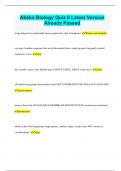
-
Abeka Biology Quiz 6 Latest Version Already Passed
- Exam (elaborations) • 2 pages • 2024
-
- $7.99
- + learn more
living things have traditionally been grouped into what 2 kingdoms? Plantae and Animalia a group of similar organisms that are all descended from a single group of originally created organisms is a(n): kind the scientific name of the loblolly pine is PINUS TAEDA. PINUS is this tree's: genus all nonflowering plants that produce seeds NOT COVERED BY THE WALLS OF AN OVARY gymnosperms because their cells DO NOT HAVE MEMBRANE-BOUND NUCLEI, bacteria are considered: prokaryot
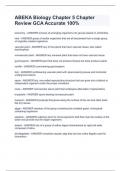
-
ABEKA Biology Chapter 5 Chapter Review GCA Accurate 100%
- Exam (elaborations) • 3 pages • 2024
-
Available in package deal
-
- $9.99
- + learn more
taxonomy - ANSWER process of arranging organisms into groups based on similarities kind - ANSWER group of similar organisms that are all descended from a single group of originally created organisms vascular plant - ANSWER any of the plants that have vascular tissue; also called tracheophyte nonvascular plant - ANSWER any nonseed plant that does not have vascular tissue gymnosperm - ANSWER plant that does not produce flowers but does produce seeds conifer - ANSWER cone-bearing gym...
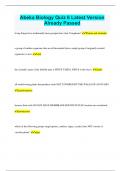
-
Abeka Biology Quiz 6 Latest Version Already Passed
- Exam (elaborations) • 2 pages • 2024
- Available in package deal
-
- $7.99
- + learn more
Abeka Biology Quiz 6 Latest Version Already Passed living things have traditionally been grouped into what 2 kingdoms? Plantae and Animalia a group of similar organisms that are all descended from a single group of originally created organisms is a(n): kind the scientific name of the loblolly pine is PINUS TAEDA. PINUS is this tree's: genus all nonflowering plants that produce seeds NOT COVERED BY THE WALLS OF AN OVARY gymnosperms because their cells DO NOT HAVE MEMBRANE-BOU...
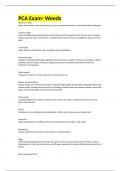
-
PCA Exam- Weeds |Complete Questions with 100% Correct Answers
- Exam (elaborations) • 5 pages • 2024
- Available in package deal
-
- $9.59
- + learn more
PCA Exam- Weeds What are weeds plants that interfere with the growing of crops or ornamental plants or cause other types of damage Invasive weeds cause ecological damage by displacing native plants and the organisms that feed on them; compete with ag crops for water and nutrients, causing them to become more susceptible to disease or other pests True weeds adapt well to local climates, soils, and other external conditions Perennial weeds capable of reproducing through vegetat...

Study stress? For sellers on Stuvia, these are actually golden times. KA-CHING! Earn from your study resources too and start uploading now. Discover all about earning on Stuvia


